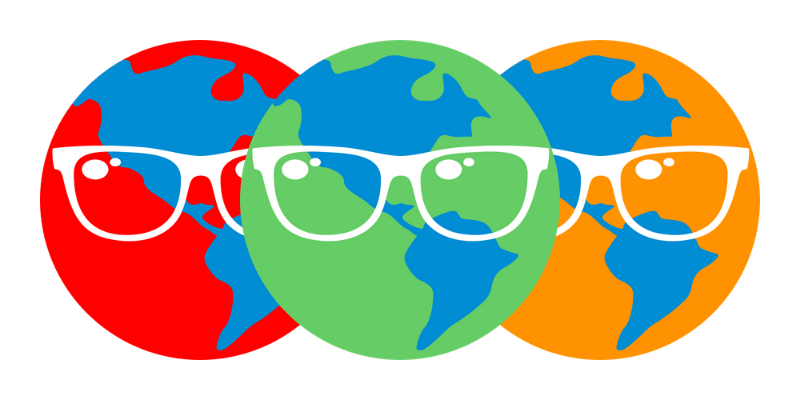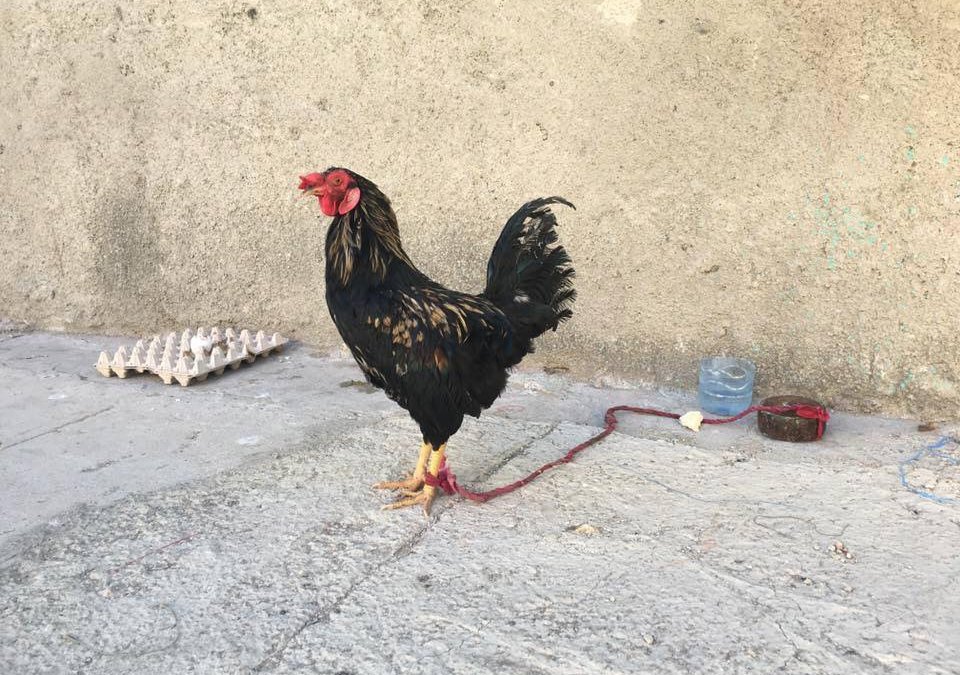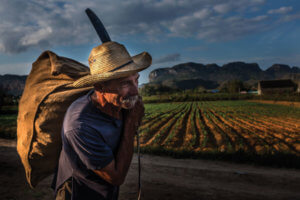I couldn’t help but notice the enterprise in Havana, Cuba, a land not known for opportunity these days.
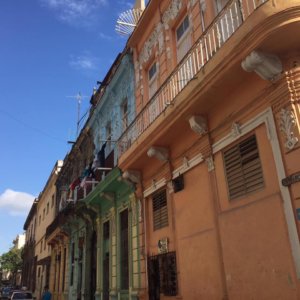
Photo credit: Kat Hendrick. Row of homes in Havana, Cuba. Looks sturdy. Look again.
Dilapidated buildings line the streets with about every 10th home crumbled to the ground revealing ghosts and debris of misplaced families. Now I know why Barbara, our guide, walked in the middle of the street instead of on the sidewalk. With open doors and simple signs, it’s easy to set up shop at a neighbor’s who has a good street front location to sell specialties to passersby. It’s just as easy to lose everything in a split second if your home decides to disintegrate into rubble on a random Tuesday. But this doesn’t define Cuba.
The air of Communism, oppression, and centuries of dictatorship and slavery hovers like a suffocating blanket…
…disguised in picture-perfect, tropical weather that keeps smiles on faces and laughter abound. With a food-rationing card, you can buy up to 5 lbs of rice per person per month for a fraction of the price after your 5 lb limit expires. The regular grocery store is more of the same: rice, dried beans, dried spaghetti, salt, sugar, rows of olive oil, and rum. Vegetables and eggs come from farmers. There’s never enough to feed someone with monthly rations, so finding ways to get more food is a business in itself. Oh, and the rum costs extra. It’s not part of the rationed pricing schedule.
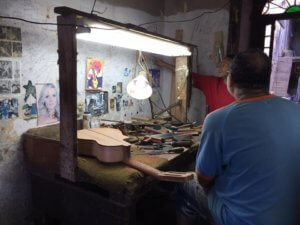
Photo credit: Sally Hendrick. The guitar luthier repairs guitars with any wood he can find. He needs strings, frets, and other materials difficult to come by.
Smells like the USSR,
but after Russia abandoned ship, Cuba is in the Special Period. It’s special because many mothers have found themselves in compromising positions to put food on the table, especially in the early nineties. Many are still wallowing in prostitution, but others have found needs to fill in the community outside of male sexual pleasure, such as making flan for special occasions or for tourists perusing the neighborhood. Some travel to Haiti to buy clothing to sell to neighbors. The luthier making guitars out of scrap wood was probably the most beautiful surprise we found when we noticed his creations in various states of construction hanging from the clothing line on his balcony across from Nila’s habitacion. He’s in desperate need of frets and nylon strings, the good ones that he can’t get from the US, so he buys through someone in Canada who upcharges them and gets them to him that way.
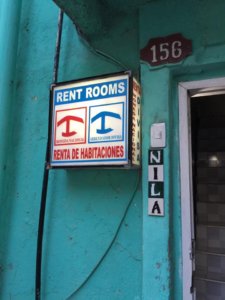
A habitacion is where you stay with a family or host who is licensed to operate like a bed & breakfast.
Nila was a great hostess,
like her mother and grandmother before her, trying hard to slow her Spanish to my crawl. She had a couple of younger girls mop, clean the bathroom, and cook us breakfast a few of the days of our stay, so she could tend to other things, like worrying with Airbnb’s payments not getting distributed yet for the month because the government felt like shutting off the funds from VaCuba without warning. Fortunately she was able to buy a bottle of water-downed bleach from the man who yells out “Cloro! Cloro!” from his rolling cart in the street. With cleaning supplies hard to come by, the bleach man makes a living selling plastic bottles he fills each day and waters down. It was the bread man who woke us at 7 am each morning like clockwork with his “Panedor! Panedor!” chant that revealed the cadence of a dialect only Trinidadian Cubans have. My husband recorded him on his phone, so he can play it for me in the mornings when I’m stretching my sleep a bit too long.
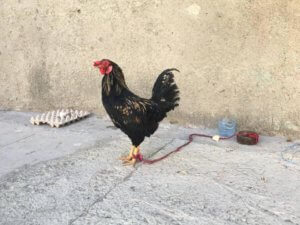
Photo credit: Robert Hendrick. Rooster tied to a wheel next to an egg carton.
Take a rubber band, wrap it around a society giving room to stretch but only so far.
That’s how I describe today’s Cuba. It’s much better than it was before Obama opened relations again. Since that happened, Cubans can access the Internet with restrictions, get visits from family that left after Fidel took over, travel with visas to the US if they’re lucky enough to get them granted by the new US embassy. They don’t get hauled off to jail for the tiniest little things anymore, and people feel a bit freer to do business amongst each other since Americans are staying in homes more and more and tipping the hosts.
I asked my Cuban friends what their biggest hopes were, and they said that they want more and more to have the freedom they deserve, to be enterprising and resourceful without oppression and restrictions. Each month seems to get better for them with a few setbacks from time to time, but all-in-all, the progress over the last 2 years has been astounding in giving them more access to things we take for granted. It’s not perfect, and there is ample need for improvement, less government restrictions, and so forth, but these things take time. With Trump’s changes to roll back what Obama put into place, the Cubans are experiencing one of those setbacks. Possibly a very damaging one.

Photo credit: Kat Hendrick. 1950’s Bel Air in Havana, Cuba.
I could talk about the vintage American cars…
…used as taxis vs government taxis, homestays vs government hotels, the beaches, the tobacco farms, private money exchange vs airport kiosks, pesos convertibles (CUC) vs regular pesos (CUP), cash requirements to get through your stay, and highlights of Havana, but you can find that anywhere on the Internet. If Americans can’t travel freely to Cuba anymore because of the latest order by Trump, Americans will have to take a clandestine route to get there through Mexico or Canada again….and even then, pre-planning will be next to impossible. It will also cost a lot more to go if commercial airlines are forced to stop their routes. So what’s the point in me giving all my travel tips? I’d rather say what I think of Trump’s latest order.
There are better, measured ways of handling this. The Cuban people, like Nila, Barbara and the guitar luthier, will suffer greatly from Americans not being able to travel again. Most Americans stay with host families because the government owned hotels are $500 to $700 per night, and host homes are $15 to $25 per night. So what if the furnishings are simple? The people work hard and keep everything clean.
We bought breakfast each morning from our host because we knew she needed our business. We bought flan from her neighbor, exchanged money through her friends and our private tour guide. We paid private taxi drivers tips and used them over government taxis as much as possible.
I find it rather suspect when someone in the US government, who has never experienced anything under 5 stars, makes the assumption that Americans are bellying up to the bar in government hotels when local eateries cost 1/10 of the price. We fed our entire family of 5 at a local kiosk dinner for under $4. A restaurant would have been about the same as most quick-service restaurants in the US. Sure, some tourists spend more out of ignorance or fear, but come on! Cubans are human beings with an underground enterprise system that is steeped in hard work, ingenuity, and love for their fellow man.

Cuban children eagerly awaiting our gifts.
Reversing what Obama put into place, instead of looking for ways to improve upon it and make more headway, is a crying shame.
Rubio has his opinions, which are steeped in his re-election by Cubans of Miami who have horrific Fidel stories of a different era. He has to represent his constituents. For Trump to only look at Rubio for research is negligent. The government of Cuba is still very corrupt. There’s no doubt. The US needs to do something to help these people further, but putting fear into Americans that if they travel there they will get into trouble or end up in a precarious situation is irresponsible. It’s the American people who are helping Cuban people – one suitcase after another full of clothing, toys, guitar strings, and fishing wire. They need our charity, our visits, and our genuine caring for humankind.
When will Cuba no longer be just out of reach?
John Partipilo’s amazing photo journey explained in the Nashville Scene. Order the book at https://johnpartipilo.com/

Hendrick family on vacation in Cuba, March 2017.
See entire photo collection from the Hendrick Family on Facebook from Cuba March 2017
Sally Hendrick, contributor for Social Media Examiner and founder of Social Media Traffic School, has traveled the world, husband and children in tow, telling stories of the people while working, blogging, and speaking to budding entrepreneurs about how to grow their businesses online with social media marketing and advertising.
Her 25 year statistical background for Fortune 100’s and 500’s mixed with her content marketing savvy is incorporated into her digital courses on sales funnels and Facebook advertising. Get more information at Go-Sally-Go.com, an online consulting agency serving hundreds of entrepreneurs and marketing departments around the world.
Want to know how we handled our travel arrangements? Join the Sally Forth Travel Club.
